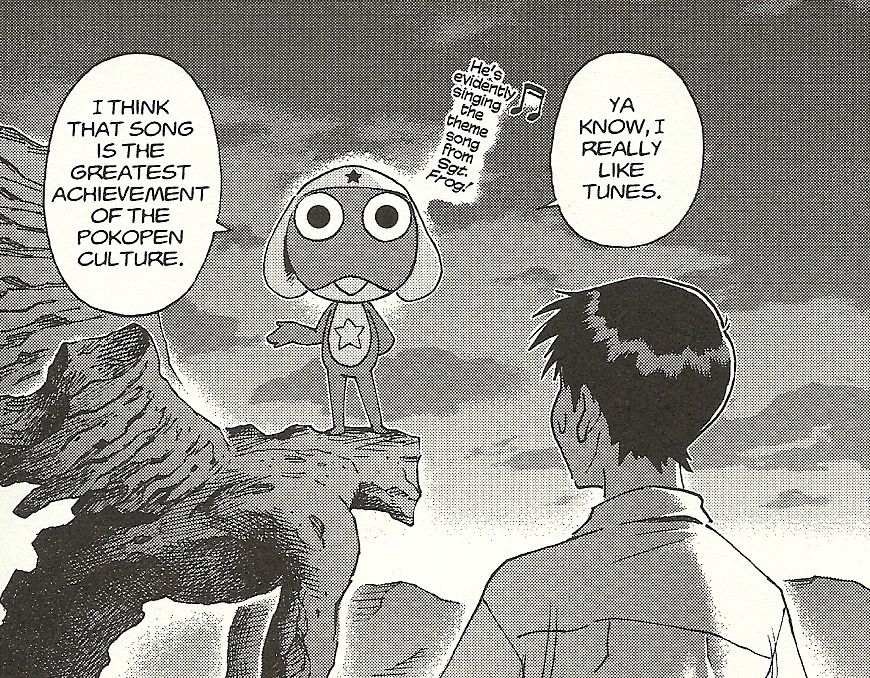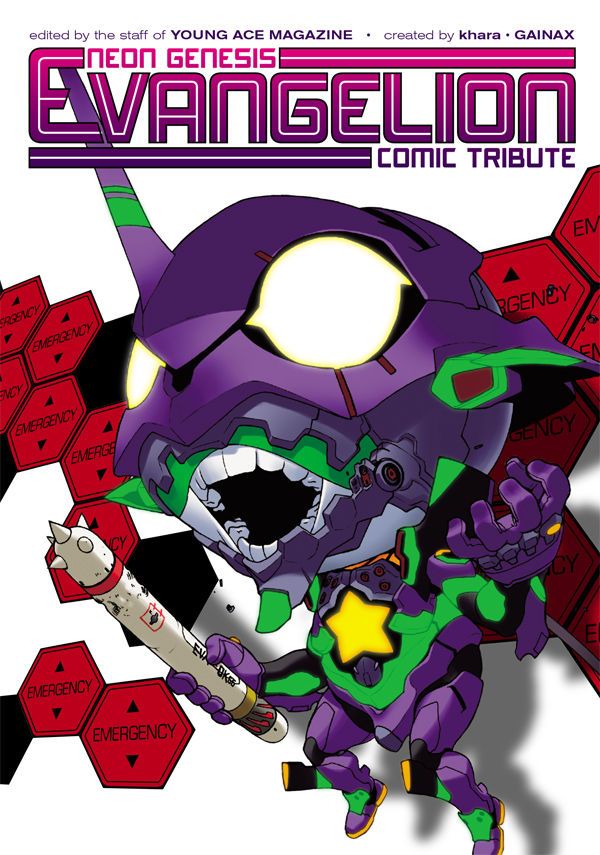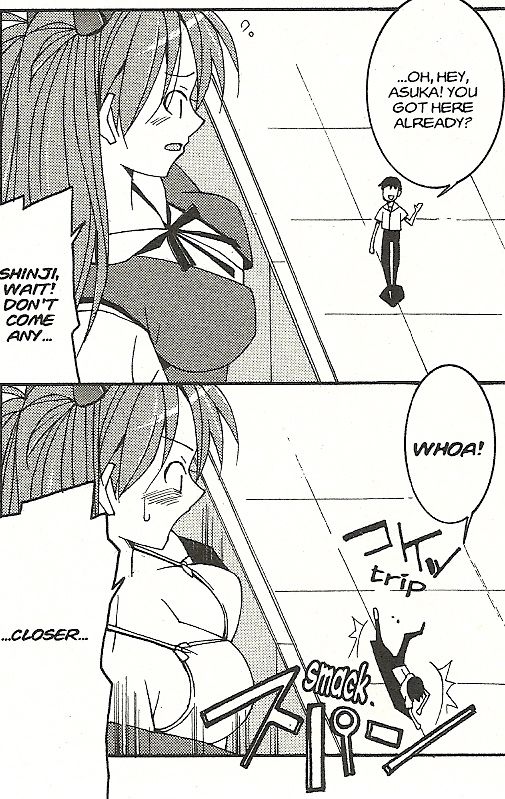The concept of doujinshi might seem a little foreign to many mainstream American comics fans, but that's to be expected — doujinshi are the product of a foreign culture, after all.
Something like a cross between fan fiction and minicomics, doujinishi are most often defined as self-published parodies, extrapolations or fantasies revolving around popular, existing (and generally copyright-protected) characters and franchises. They're generally created by fans for other fans, although the doujinishi culture is so pervasive in Japan that the phenomenon is tolerated and, in some cases, even encouraged and participated in by professional creators (and copyright holders).
Western otaku have likely seen more than their fair share of doujinshi, but more casual Western comics fans likely haven't had any real exposure.
Enter Dark Horse's recent Neon Genesis Evangelion: Comic Tribute, an officially sanctioned, professionally curated and created, $11, 170-page doujinishi-style anthology, produced and published in the digest-sized tankobon format made familiar to American manga fans over the past decade and a half or so.
But what is it, exactly? A bunch of different manga creators, the most prominent among them probably being Sgt. Frog's Mine Yoshizaki, providing short, parodic riffs on various aspects of the Evangelion franchise. Think of it as the manga equivalent of a celebrity roast.
I was excited about the book's existence, as I think it's an interesting model for a comic exploiting a popular franchise, and seems like it would potentially be a fun, creatively fulfilling way to offer fans of a franchise more of it, and a way to potentially produce better comics than the way the U.S. comics industry generally approaches franchise exploitation.
Think of DC's He-Man, Smallville or Batman Beyond comics or BOOOM!'s Planet of the Apes or Dynamite's pulp and public domain-derived series or IDW's many comics based on toy lines, movies and, in at least one case, a trading card set. Regardless of the quality of some of those, something like the NGE Comics Tribute seems like a viable second path to the same end goal of getting comics in the market featuring certain characters and concepts. Instead of straight, linear adaptations produced in the series of miniseries format, why not try rounding up a bunch of talented, creative folks to do whatever they want with them, and selling the results?
As a grown man who reads comics and played with He-Man toys as a child, I'd be much more likely to spend $20 on a He-Man: Comics Tribute than on any of the miniseries DC has been producing (mainstream American publishers have tried this approach before, of course; DC's Bizarro Comics and Bizarro World, Marvel's Strange Tales and Dark Horse's Star Wars Tales come to mind as similarly intentioned projects).
I was also excited about NGE Comics Tribute because I really liked the original Neon Genesis Evangelion anime, which I am chagrined to note that I watched on VHS tapes, a series that is in fact now so old that the post-apocalyptic near future that the late-'90s series was set in is now only two years away.
I thought I was pretty well-versed in the franchise, having watched the original series all the way through three or four times, the End of Evangelion movie and the two "rebuild" reboot movies, and having read maybe the first half-dozen volumes of the original manga adaptation and at least starting manga series Angelic Days and Campus Apocalypse.
That background seemed somewhat insufficient for completely enjoying NGE Comic Tribute, though. There were a lot of jokes and references I didn't get, and in several instances it seemed like that was because I lacked knowledge of the creators involved and some of their signatures works. Like, the four-page meeting between Sgt. Frog and Shinji that closes out the book only made sense to me because I've read Sgt. Frog; if I hadn't, I'm not sure what I would have made of it. Several other stories similarly revolve around in-jokes that are either deep, deep within NGE and/or some of its spinoffs, or the work of the creators, most whom I was unfamiliar with.
Fans of the franchise will naturally find a lot to like here, and I'm sure there are more than enough Evangelion fans to make a successful and receptive audience for the book (which closes, I should note, with an ad for Neon Genesis Evangelion: Shinji Ikari Detective Diary, which, when added to Shinji Ikari Raising Project and Campus Apocalypse, will make three ongoing Evangelion series Dark Horse is publishing).
There are stories riffing on aspects of the franchise broad (the pilots fretting over the public perception that they are whiny and off-putting) and minute (how the pilots clear the L.C.L. liquid from their lungs). There are stories set around specific scenes. There are a lot of gags regarding "fan-service," which also happen to serve as the very sort of fan-service they're making fun of (one story, for example, mocks Shinji's ability to keep clumsily stumbling into sexually suggestive situations by exaggerating it to the point where female co-stars' clothes fall off in his presence). There are even two pretty straightforward, dramatic scenes.
Perhaps the greatest pleasure it affords, however, isn't in the specific jokes and stories, but in the opportunity to see so many different creators draw the familiar characters in so many different styles.
One great advantage manga has over Western super-comics is its consistency in style and quality; as Dirk Deppey once memorably explained when comparing two different multimedia franchises and why one's film adaptation might drive sales of comics better than the other's, a kid can pick up any volume of Naruto and be confident in what the art will look like, who the characters will be and what the story will be about, whereas a kid picking up something with the word "X-Men" in the title could get any one of hundreds of different variations of art, story and characters.
One of the pleasures of super-comics, though, is seeing what different artists can bring to a preexisting, already conceived and designed character. Batman, for example, will almost always look like slightly different every time a different artist draws him, and seeing different artists draw the same thing is a wonderfully effective way to separate what's different or special or unique about that artist's style.
Likewise, it's cool to see Shinji, Rei, Asuka, Gendo and other characters drawn in radically different styles by different artists.
This book is a tough book to recommend to readers, as it's pretty much only for Evangelion fans, and even then, a particular, particularly hardcore sub-set of those fans: those who are a lot more knowledgeable of the franchise than I.
The idea of the book, though, the doujinshi-derived premise of various artists having fun with and making fun of a popular franchise, bringing their own styles and points-of-view to a shared cultural experience? That's something I find quite easy to recommend to Western publishers.



